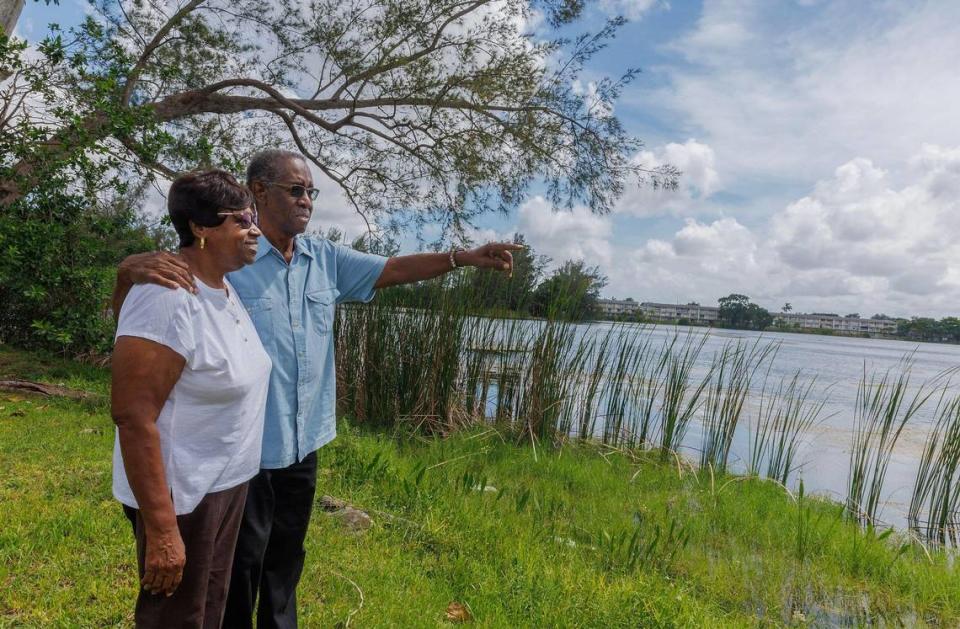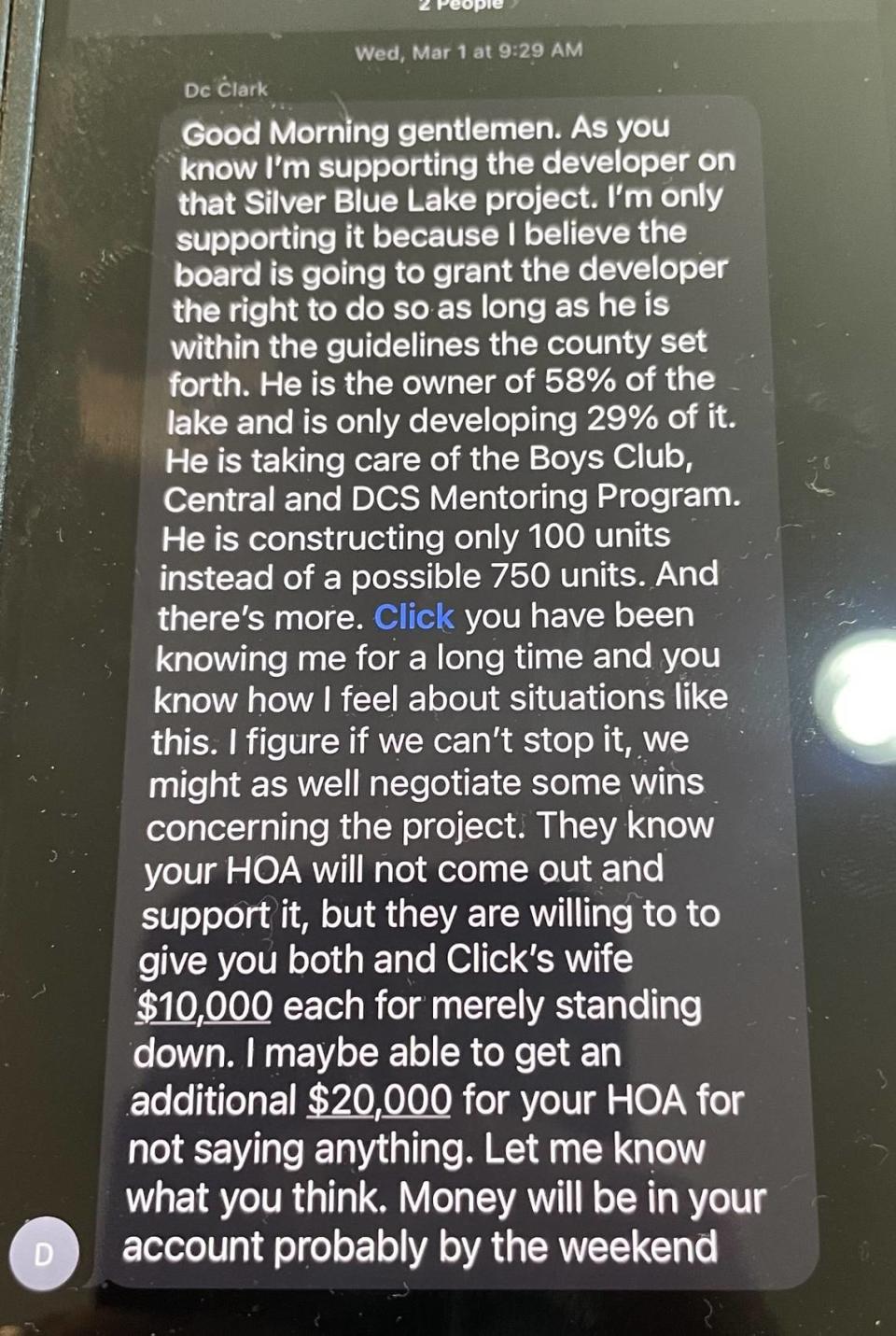They live on a lake outside Miami. A developer wants to fill part of it for apartments
An iguana falling from a palm tree qualifies as excitement on the lake for Anthony Johnson, whose home overlooks tranquil waters that obscure what could be Miami’s next bustling construction site.
For the moment, the 30-acre parcel sits 10 feet underwater at the bottom of Silver Blue Lake, a former rock pit in the Little River Farms neighborhood north of Miami.
An entity controlled by developer Karim Lakhdar purchased the underwater land off Northwest 17th Avenue for $750,000 in 2018, banking on winning approval from Miami-Dade County to fill part of his acquisition and build apartments on the newly created real estate.
“Never did I think someone would want to fill in the lake,” said Johnson, an 64-year-old retired police officer. “I’ll see windows and doors and balconies. Right now, I see peace and tranquility.”
County development rules allow artificial lakes to be filled for construction under some circumstances, and Miami-Dade’s planning staff in a July 24 memo recommended approval of Lakhdar’s proposed Lake Sana project if the planned use of clean construction debris to fill the lake meets county environmental standards.

Lakhdar touts the plan as a way to create working-class housing while building only about 13% of the nearly 750 apartments than Miami-Dade planning staff said would be allowed under existing rules. The original application asks for 249 apartments, but Lakhdar said he reduced the amount to 100 after push back from nearby residents, who are complaining of traffic in the largely residential neighborhood.
By building a bridge from Northwest 17th Avenue to a newly filled island of 10 three-story apartment buildings and parking lots, Lakhdar notes more than half of the lake would remain. That includes a roughly 12-acre underwater portion owned by the Boys and Girls Club of Miami. Lake Sana will fill in about half of the lake it purchased five years ago, meaning roughly 38% of the 80-acre lake would be converted to a new apartment complex.
“They’re always going to have their lake view,” he said. “We designed it on purpose that way.”
A hearing on the proposal by Lake Sana Developments, the Lakhdar corporation that owns the underwater site, is scheduled for Thursday, Sept. 14 at 7 p.m. at Gwen Cherry Park before the Community Zoning Appeals Board. Final approval rests with the County Commission.
The project has faced some challenges during the development process. Lake Sana Developments is in a foreclosure suit over the lake site, and was in bankruptcy proceedings for three months in early 2022 in connection with the dispute. Lakhdar said Thursday that his investors “have agreement with our lender to finance the project construction” and that he expects the litigation to be settled shortly.
With some nearby homeowners like Johnson rallying to block the project, building neighborhood support is part of Lakhdar’s plan as he pursues approval by the County Commission. He’s pledging money for new athletic facilities at the Boys and Girls Club complex that sits on county parkland on the lake.
“We’re creating a new football field. And new basketball courts,” he said. “That place needs an entire renovation. And we’re glad to do it. We want to be part of the community.”
Lakhdar also said he’s pledging financial support to a mentor program run by William “DC” Clark, a community activist who in 2022 ran for the District 2 county commission seat won by Marleine Bastien, whose district includes the Lake Sana site.
Allegations offers of payment for silence
Opponents of the project say Clark told them Lakhdar would pay them directly in exchange for them agreeing not to fight the project.

“I figure if we can’t stop it, we might as well negotiate some wins concerning the project,” read a March 1 text message from Clark’s cellphone number to Richard “Click” Johnson and a second volunteer leader of the Little River Farms Homeowners Association. “They know your HOA will not come out and support it, but they are willing to give you both and Click’s wife $10,000 each for merely standing down.”
Johnson, whose nickname comes from his former occupation as a county photographer, said he declined the offer.
“Give me $2.5 million and I’ll think about it,” Johnson said in a recent interview. He’s now helping lead the fight against the project. “Somebody needs to stand up for the neighborhood,” he said.
His wife, Jannie Johnson, is retired from the Miami-Dade Corrections Department and said she wasn’t interested in being paid for keeping silent on a neighborhood issue. “It was a bribe,” she said. “If you would take it.”

The other association officer in the text exchange, Keith Carswell, said he didn’t remember receiving the written offer from Clark. In an interview, Clark declined to comment on his alleged text but said Lakhdar never instructed him to offer money to anyone to take a position on the project.
“He did not,” Clark said of Lakhdar. “Even though most developers do.”
Lakhdar, a Miami developer with an affordable-housing project underway in Liberty City, also denied wanting to pay neighbors for staying neutral on his project.
He speculated the claim of direct payments to neighbors stemmed from his plan to spend money helping the neighborhood in exchange for county approval of the project.
“I think people misunderstand. We’re offering a community benefits package,” he said. “We’re not paying any residents.”
The text exchange Johnson showed the Miami Herald has Clark mentioning Clark’s planned support of the existing Boys and Girls Club location on the lake and nearby Miami Central High School. It also has him telling Carswell and Johnson they could pocket money directly for staying on the sidelines.
“Right now it appears you are in the cat bird seat and they are willing to compensate you for not coming against them,” a March 7 text message read. “In other words they will pay you for your silence. Right now, I’m sure you get $50,000 to split among a few of you and if you play your hand correctly you may get twice that.”
Disputing the allegations
Lakhdar said Clark didn’t have authority to make any offers on his behalf.
“DC Clark does not represent me,” he said. “He’s a nice guy. He’s looking out for the community. I know he’s a very respected person. If he didn’t like the project, he wouldn’t support the project.”
In an interview, Carswell said he did speak in favor of the Lake Sana project at a town hall but has since changed his position and now opposes the effort. “There are some concerns that hopefully can get mitigated,” he said.
Richard Johnson lives about four blocks from Anthony Johnson’s lakefront home. The two aren’t related, but are part of a group of homeowners arguing Lake Sana would unfairly rob the neighborhood of a scenic landmark.
“I go outside in the afternoon. And I just stand and look out on it,” said Moyel McKnight, a lakefront homeowner who keeps a binder filled with paperwork related to the Lake Sana project.
That includes the 2018 county notice of the proposal to build apartment buildings on a filled-in lake. “I couldn’t believe it,” said McKnight, a retired carrier for the U.S. Postal Service.
Affordable housing sorely needed
With Miami residents facing one of the least affordable housing markets in the country, the prospect of creating land for 100 apartments has appeal. Lakhdar said he will participate in a county program that rewards developers for targeting “workforce” rents — a range that typically tops out at $3,000 for a two-bedroom.
Lakhdar said he’s planning lower rents than that, matching what he sees as needs in the neighborhood.
“We want the children and grandchildren of the people living in the neighborhood to be living in our apartments,” he said.
Plans for the project show a causeway crossing from the shore off Northwest 17th Avenue into an island Lakhdar would create for the 10 three-story Lake Sana buildings, parking lots, and recreational areas.
Lake water would surround the new Lake Sana shoreline, a few hundred feet from the lakefront property
that Anthony Johnson purchased for $105,000 in 2011.
On a recent afternoon, Johnson walked to the shore he owns, along with roughly 60 feet of underwater land on the deed as reflected in county property records. He has a pontoon boat dragged up by a break in the cat tails that line the shore, a vessel damaged when a tree fell on it during a storm. There was a splash by a remaining cluster of trees as Johnson continued the tour. “That’s an iguana that fell,” he said.
Johnson said he sees his lakefront backyard as part of the reward for a long career in county government. He questions how Miami-Dade could accommodate a developer wanting to drain so much of the lake water before him and replace it with buildings.
“Would this happen if we were in an affluent area like Coral Gables or Aventura?” he asked. “It’s ridiculous.”

